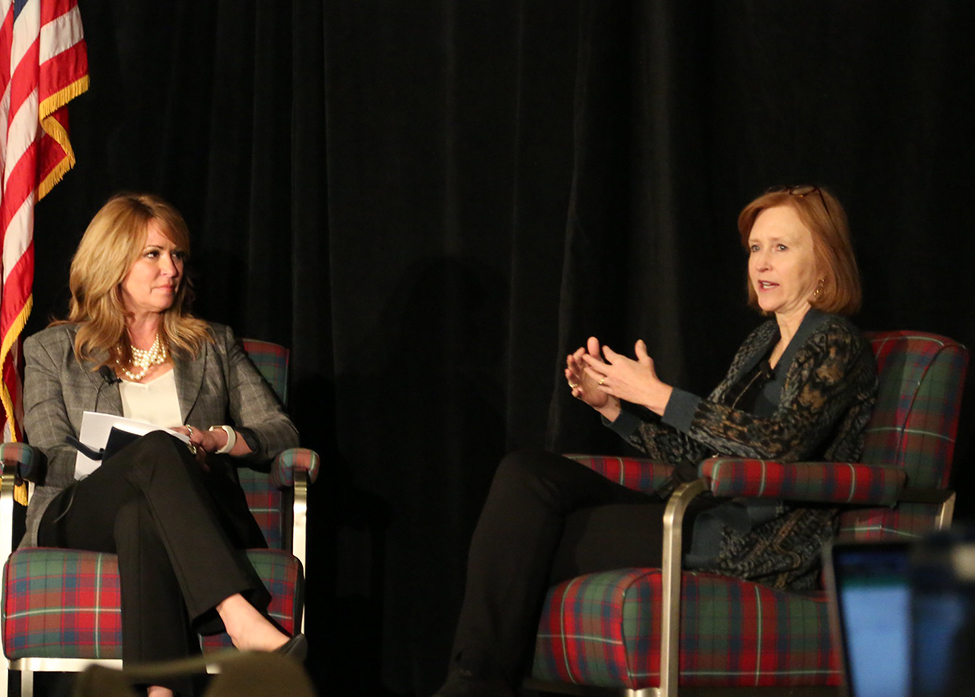Rachel King, Interim CEO of the Biotechnology Innovation Organization (BIO), described the organization’s work and goals for 2023 at the Maryland Tech Council (MTC)’s annual advocacy summit in Annapolis Thursday.
“We want to have policy in place that enable the industry to thrive, which we think is going to also help our communities and our patients,” King said during a fireside chat with Kelly Schulz, CEO of the Maryland Tech Council, BIO’s affiliate in Maryland.
King listed some of BIO’s key priorities for work in 2023, including promoting the appropriate implementation of the Inflation Reduction Act and passage of the PASTEUR Act, a focus on agriculture and the environment, working toward diversity hiring, protecting international IP—and more.
King also noted Maryland’s history of supporting the industry. She said she got her start there about 30 years ago when Maryland was home to three early biotech companies. Since then, Maryland has grown to become a major biotech player.
“We’re here because I think that Maryland can be the greatest state in the nation for these industries,” said MTC CEO Schulz.
How biotech can help patients
“We want to have policy in place that enables the industry to thrive, which we think also is going to help our communities and our patients,” King said.
To achieve this, “we need to communicate what is important about our industry, and we need to make sure that legislators appreciate what it is that biotech brings, not only to the patients but to the communities that legislators serve.”
Educating the public and legislators is essential to BIO’s mission, according to the BIO Interim CEO.
“When I first got into biotech and I first started doing lobbying, I talked a lot about innovation, and I learned that innovation in the abstract, people don’t care about. People care about what specific things we can do to help specific patients,” she said. “We need to care about innovation, but we also need to care about another aspect of that circle, which is affordable access. We have to be sure that patients can affordably access our medicines.”
For patients, affordability is all about out-of-pocket costs, so it’s important that they understand the role insurers and other stakeholders play in those costs.
“Drug pricing in this country is complicated,” King explained. “We need to simplify how we educate people around those issues.”
Meanwhile, developing new drugs is also essential to enabling access. “Legislators need to understand that innovation really goes along with access,” she explained. “We can work together to really create the conditions under which entrepreneurs can then go and start their company, to bring their ideas forward to fruition for patients.”
Advocacy is ‘all about networking’
MTC’s Schulz said the key to educating legislators is to engage them in conversation and help them understand the issues: “It’s all about networking,” she said.
Whether you are trying to talk to legislators or business partners, biotech is really a people business, King said. She recalled her brief sojourn into venture capital, where she learned investors made deals with people they know and trust. When partners were handed a business plan, “I would observe someone opening the business plan and flipping to the management section,” to see who was behind the proposal.
“One thing that taught me was, even in technology fields like biotech, first you want to know: who are the people behind this? And then you want to know: what is the technology?” she said.
BIO Interim CEO is optimistic about biotech
When King started her career in Maryland, biotech was a new industry. Now, biotech has become a major industry in the state.
“We’re here because I think that Maryland can be the greatest state in the nation for these industries,” Schulz agreed.
“Some of the work that’s gone on with gene therapy started right here in Maryland,” King said. “And now gene therapy is a platform technology widely applied across a whole range of diseases.”
The exciting developments that have been made and “the progress that we’re going to be continuing to make” offer a lot of reason for optimism about the industry and the health of society, King said. BIO will be working with policymakers to support that progress, she added.
“Policies and government work best when we can ask our government to establish infrastructure to create an environment that is supportive, and then provide as much freedom as possible for the entrepreneurs to do what they do well,” King said.




